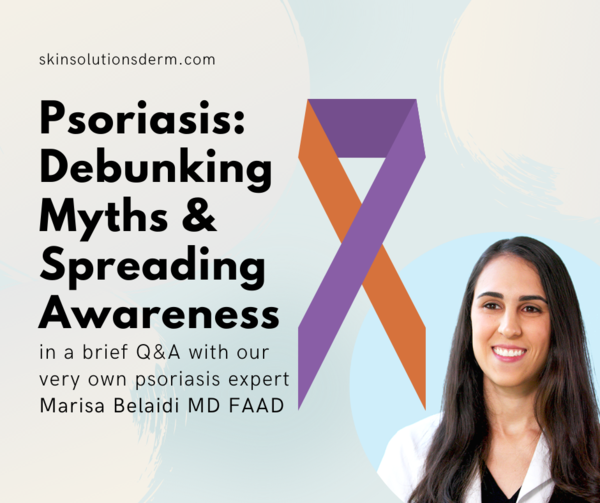
Psoriasis Action Month is coming to a close, however, it’s never too late to help show your support. It is our goal to help spread knowledge about psoriatic disease and to do our part to debunk the myths and misconceptions surrounding this skin condition. We interviewed our very own psoriasis expert, Marisa Beladi MD FAAD to debunk some common myths and share knowledge based on her experience with patients who suffer from psoriasis.
In your experience, what are the most prominent myths associated with Psoriasis or Psoriasis sufferers?
One of the largest misconceptions I encounter in my patients with psoriasis is that patients are worried that it may be contagious or that they may have acquired the condition through poor habits. It is neither transmissible from person-to-person nor is it a result of poor skincare.
Have you noticed a marked improvement in psoriasis medications or treatment options since you began working in the medical field? What about with the spread of awareness?
In the past few years alone, we have seen tremendous advancements in the treatment of psoriasis and psoriatic arthritis. With active campaigns by the National Psoriasis Foundation and the American Academy of Dermatology, we as dermatologists have been working hard to spread awareness and information on this condition.
Typically, what is the main concern for patients being seen for Psoriasis?
The most common concerns I encounter are usually related to the appearance of the psoriasis plaques in the skin. Patients are often worried about the appearance of these plaques, as they can be quite noticeable to both patients and those around them.
What advice would you offer patients upon being diagnosed with a form of Psoriasis?
First, I would reassure patients and instruct them to take a big, deep breath in and out. This is a very manageable skin condition and modern medicine can clear most patients pretty quickly after initiation. Compliance with a good regimen is the key to continued clear skin! I also recommend a well-balanced healthy diet and routine follow-ups with a primary care physician, as psoriasis can be associated with other health conditions such as cardiovascular and kidney disease.
Are their certain triggers for flare-ups and what can patients do to reduce these?
There are several conditions that can trigger psoriasis flares, which may include but are not limited to:
-
INFECTIONS
-
STRESS
-
MEDICATIONS
-
ALCOHOL
-
SMOKING
-
PREGNANCY
-
OTHER UNDERLYING HEALTH CONDITIONS
I recommend decreasing alcohol intake, smoking cessation if possible, regular stress relieving activities such as meditation and exercise and a healthy diet such as the Mediterranean Diet.
How can patients continue to stay connected to others affected by Psoriasis and spread awareness during the Covid-19 global pandemic?
There are many psoriasis support groups online and the National Psoriasis Foundation is a great place to start.
You can access their website here: https://www.psoriasis.org/
What resources are available to physicians who would like to help promote awareness and education?
American Academy of Dermatology
My Psoriasis Team: Free Psoriasis Social Network
Psoriasis can be an isolating skin disease despite typically being a manageable one. We hope that by sharing the knowledge and experiences of our psoriasis expert, Dr. Belaidi, that we help lend our support to our patients or their family members who may be suffering from psoriasis. Our patients are part of the SSD Family and we love giving back in any way that we can! Do you have a psoriasis story that you would like to share with us? We would love to hear from you! Send your story or photos to: patienthappiness@skinsolutionsderm.com
